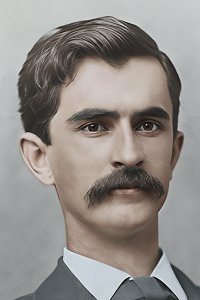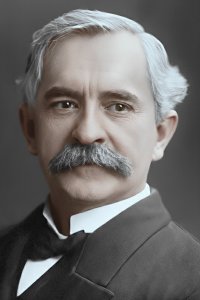Introduction

Born: July 6, 1854, on a farm near Shelby, North Carolina.
Died: June 14, 1925, Baltimore, Maryland.
Buried: Baltimore National Cemetery, Baltimore, Maryland.


Born: July 6, 1854, on a farm near Shelby, North Carolina.
Died: June 14, 1925, Baltimore, Maryland.
Buried: Baltimore National Cemetery, Baltimore, Maryland.

Amzi was the son of Thomas Jeremiah Frederick Dixon, a Baptist preacher, and Amanda Elvira McAfee, brother of novelist Thomas Dixon, Jr., and husband of Helen Cadbury Alexander (married 1924)
While still young, Dixon believed he was called to preach the Gospel. In 1875, he graduated from Wake Forest College in Wake Forest, North Carolina.
He was ordained in 1876 and immediately began serving as pastor of two country churches. He also pastored in Chapel Hill and Asheville, North Carolina, before attending Southern Baptist Theological Seminary (then in Greenville, South Carolina), where he was a student of John A. Broadus.
Later, Dixon had pastorates at Immanuel Church, Baltimore, Maryland (1883–90); Hanson Place Baptist Church, Brooklyn, New York (1890–1900); Ruggles Street Church, Boston, Massachusetts (1901–06); Moody Church, Chicago, Illinois (1906–11); and the Metropolitan Tabernacle, London (1911–19).
Because of the popularity of his speaking, he often rented the Brooklyn Opera House for Sunday afternoon evangelistic services. After leaving Brooklyn, he moved to Roxbury, Massachusetts, and became pastor of the Ruggles Street Baptist Church. While there, he also taught at the Gordon Bible and Missionary Training School, and turned his passion to writing, publishing Old and New, an attack on the liberal Social Gospel movement.
From Boston, he moved in 1906 to Chicago’s Chicago Avenue Church, which had been founded by Dwight L. Moody. Two years after his arrival there, the church changed its name to the Moody Church, and he continued there until 1911. While at Moody Church, he became a syndicated columnist, appearing in newspapers such as the Baltimore Sun, Boston Daily Herald and the Chicago Daily News.
He then crossed the Atlantic and ministered at London’s Metropolitan Tabernacle, the church formerly pastored by Charles Spurgeon and other notable preachers, where he spent the war years. During this time, he often spoke at Bible conferences.
He retired in 1919, but was called out of retirement in 1922, and became the first pastor of University Baptist Church in Baltimore, Maryland.